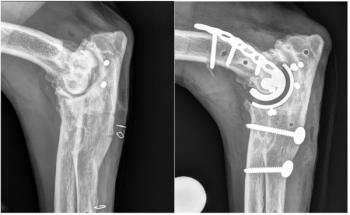
Comparison of Cosyntropin Doses for ACTH Stimulation Testing
A report recently published in the Journal of Veterinary Internal Medicine compared doses of cosyntropin for adrenocorticotropic hormone (ACTH) stimulation testing in dogs.
A report recently published in the
The study was performed in 2 phases. The purpose of the first phase, which included 10 healthy dogs, was to determine whether 2 ACTH stimulation tests could be performed on the same day without affecting the results of the second test. Blood samples were collected just prior to IV injection of cosyntropin 1 µg/kg (at hour 0) and 60 minutes later (hour 1). At hour 4, blood samples were collected and cosyntropin 5 µg/kg was injected IV. A final blood sample was collected at hour 5. The 2 doses of cosyntropin resulted in equivalent increases in serum cortisol concentration. This result agrees with those of previous studies showing that 1 µg/kg and 5 µg/kg of IV cosyntropin produce the same cortisol response in healthy dogs.
The second phase included 39 dogs suspected of having hyperadrenocorticism and 27 dogs with previously diagnosed pituitary-dependent hyperadrenocorticism; 12 of these were being treated with mitotane and 15 were being treated with trilostane. ACTH stimulation tests were performed as in phase 1 for the dogs with suspected hyperadrenocorticism and those being treated with mitotane. Because ACTH stimulation testing must be performed at a specific time after trilostane administration, the 2 tests were performed on different days in dogs receiving trilostane.
In dogs suspected of having hyperadrenocorticism, the 2 doses of cosyntropin did not produce equivalent serum cortisol concentrations. The clinical interpretation of the results was different in 9 of the 39 dogs (23%). In 4 dogs, low-dose test results were in the reference range but high-dose test results were consistent with hyperadrenocorticism.
In dogs with pituitary-dependent hyperadrenocorticism being treated with either mitotane or trilostane, the 2 doses resulted in equivalent serum cortisol concentrations. Although the clinical interpretation of the results was different in 5 dogs (18%), the implications were not as serious as for the dogs suspected of having hyperadrenocorticism. In 3 dogs, for example, results of one test suggested “ideal control” and results of the other suggested “acceptable control”.
Reducing the dose of cosyntropin to 1 µg/kg IV would reduce the cost of ACTH stimulation testing for owners of dogs currently being treated for hyperadrenocorticism. The authors recommend that dogs being screened for hyperadrenocorticism still receive the conventional dose of 5 µg/kg IV.
Dr. Laurie Anne Walden received her doctorate in veterinary medicine from North Carolina State University. After an internship in small animal medicine and surgery at Auburn University, she returned to North Carolina, where she has been in small animal primary care practice for over 20 years. Dr. Walden is also a board-certified editor in the life sciences and owner of Walden Medical Writing, LLC.
Newsletter
From exam room tips to practice management insights, get trusted veterinary news delivered straight to your inbox—subscribe to dvm360.






